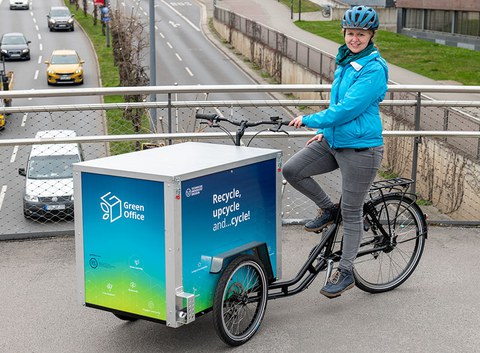Apr 11, 2023
Sustainability in teaching is not just an environmental issue
Dagmar Möbius
In the 3/2021 issue of Kontakt-online, we introduced the coordinator of the Green Office at TU Dresden, Alexandra Seifert. Her primary goal at the time was to make existing sustainability measures more visible. Today, we present her update on sustainability issues in teaching.
Ms. Seifert, following up on our conversation a year and a half ago: Are you still a lone fighter?
Alexandra Seifert (laughs): Regarding my position in the Green Office, formally yes. But the measures that already exist at TUD involve countless committed people.

Alexandra Seifert with her cargo bike
We'll follow up on that. For now: How important is sustainability in teaching?
The Green Office strives to raise the awareness for sustainability issues in teaching and the concept of “education for sustainable development” (ESD). And we would like to support the stakeholders. The freedom of teaching and research is guaranteed in our German constitution. That means that lecturers design their own teaching and decide to what extend sustainability and the concept of “education for sustainable development” might play a role in their teaching. And that's a good thing. We assist lecturers by connecting people, bringing them together, creating a structural setting, and offering incentives and support for putting projects into practice. For example, as a first step, we have a coaching service for lecturers.
How can you take advantage of such a coaching and for whom does it make sense?
We make appointments upon request. We primarily raise awareness for the issue and support lecturers who are interested in integrating education for sustainable development into their teaching. The educational concept of education for sustainable development differs from environmental education or the integration of environmental topics in teaching. It is all about fostering the students' shaping skills, and it has a lot to do with a distinct teaching-learning culture. How can we make teaching more participatory? How can we turn learners into stakeholders who actively shape society?
There's hardly anyone who can go on living the way they used to. It's a question of justice for future generations, but also for people all over the world. The guiding principle of sustainable development is not that new, it dates back to the 1980s. Students should ask themselves, what is the impact of my actions? What visions do we need to develop? In view of the challenges, frustration tolerance is an essential element, as is the ability to work in an interdisciplinary manner. Students are to become change agents who drive societal transformation and develop optimistic visions of how we want to live together in the future.
You'll probably not be able to do that on your own...
That's right. There is already a working group for the concept of education for sustainable development which is open to all university members, students and administrative staff. We are still looking for people who want to join us. One of our goals is to establish a large-scale continuing education program for lecturers and staff. It's also crucial and useful for us to strike up a conversation: What is missing? What hinders the realization? What wishes are there? We also want to make existing ESD activities visible and welcome feedback on what activities already exist. Education is truly dear to my heart, it is crucial to know who is doing what when it comes to sustainability. I have the impression that students would like to see more programs than there are at the moment. So we are thinking about new activities.
Let's go back to the activities that already exist. Could you please name a few?
Sure. There are the TUUWI environmental lecture series open to all, as well as the foundation lectures on ecological sustainability organized by students for anyone interested, even beyond the university. For students in teacher training, the Chair of Didactic Education and the Junior Professorship for Nutrition and Home Economics and Vocational Didactics run the campus allotment in the Botanical Garden. The service learning programs such as “reflected and committed” and praxiSDG are also worth mentioning.
It's not an educational topic, but it's a very well-attended service, too: the RepairCafé, which takes place on the third Tuesday of every month. What is less known is that you can not only repair electrical appliances there, but also use sewing machines. Volunteers are always welcome. This service is also in demand with individuals from outside the university, and it is nice to see how people get into conversation.
A mailing list on the issue of sustainability at TU Dresden and in Dresden allows you to inform yourself and pass on knowledge.
Brand new:
The 17 global goals for sustainable development of the 2030 Agenda (Sustainable Development Goals, SDGs for short) are considered a "roadmap" for the future. Different partners at TU Dresden and in the city are, with their projects and engagement, very concretely committed to these SDGs. Starting in mid-April, partners that have taken on the sponsorship of a goal will present weekly - including CIPSEM, the Professorship for Building Energy Technology, Diversity Management, ZLSB, Amnesty International Dresden, the Refugee Law Clinic, and many more. Here, those who are committed to the SDGs, and help shape them at the university or in the city, will have their say. The SDG campaign will start on the Green Office platform as well as on the TUD Instagram channel. At the same time, the sponsors will gradually be presented on this website, or educational projects here.
Contact:
TU Dresden
Directorate University Culture, Green Office
Alexandra Seifert
Tel.: +49 351 463-33037
Email
